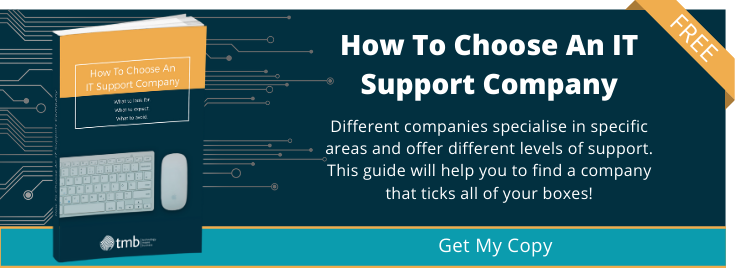What's In A Typical Managed IT Services Contract?
Moving your IT support and service provision into the hands of a trusted third-party (i.e. TMB) is an increasingly popular choice for businesses big and small. You'll get all the advantages of a professional, in-house IT department alongside the latest managed software upgrades, expert knowledge, and cutting-edge hardware without having to pay a premium for staff retention and out-of-hours support. You'll also save time, effort, and money on your part, freeing your tech staff up to be more productive.
How Does It Work?
After a consultation with your provider, you'll receive the offer of an IT support package (or tier), scaled and tuned to provide what your business needs. You'll then enter into a fixed-term contract (although some providers offer month-by-month subscriptions or rolling contracts), paying monthly to access your support remotely via the Internet, (VoIP) phones, and cloud hosting.
During this time, the third-party is legally responsible for managing what they've agreed. The contract you sign will determine the Service Level Agreement (SLA) – i.e. the scale and scope of what you'll get. Services are mixed and matched before being scaled and adapted to provide you with the best quality of service available.
Which Managed IT Services Come As Standard?
When drawing up your contract, you can usually expect to pick from:
-
Remote, automatic data storage, backups, and restorations
-
24-7 active network security, monitoring, and surveillance
-
Cloud accounts and remote app access
-
Service and scheduling automation
-
Disaster and emergency planning and mitigation, including data recovery
-
Scaling, off-site server virtualisation, including PBX phone exchanges (check with this, as not all managed IT suppliers offer cloud telecoms)
-
Web portal and public-facing (website) hosting
-
Web traffic management, both internal and external
-
Updates, upgrades, and advice on hardware replacements and revamps
-
Active, remote patching and hotfixes
-
On-site hardware repair and user advice
-
Safe end-of-life asset and data sanitisation and disposal
-
Personalised dashboard monitoring
-
Performance monitoring and alerts
-
Out-of-hours services (including all of the above)
-
Advanced IT budget streamlining
Are There Any Extras Available?
Many IT support companies also specialise in secondary areas, such as support for specific software applications (e.g. Microsoft 365), telecoms provision, hardware acquisition/infrastructure management, or business planning. Providers also frequently offer additional 'scaled-up' services for high-traffic companies or those who've grown past SME status.
Managed IT and More From TMB
TMB are specialist managed IT support and service providers, serving clients across the South of England. We can supply all of the above - and much more. Contact us today to see what we could for you.
Image Source: Canva


